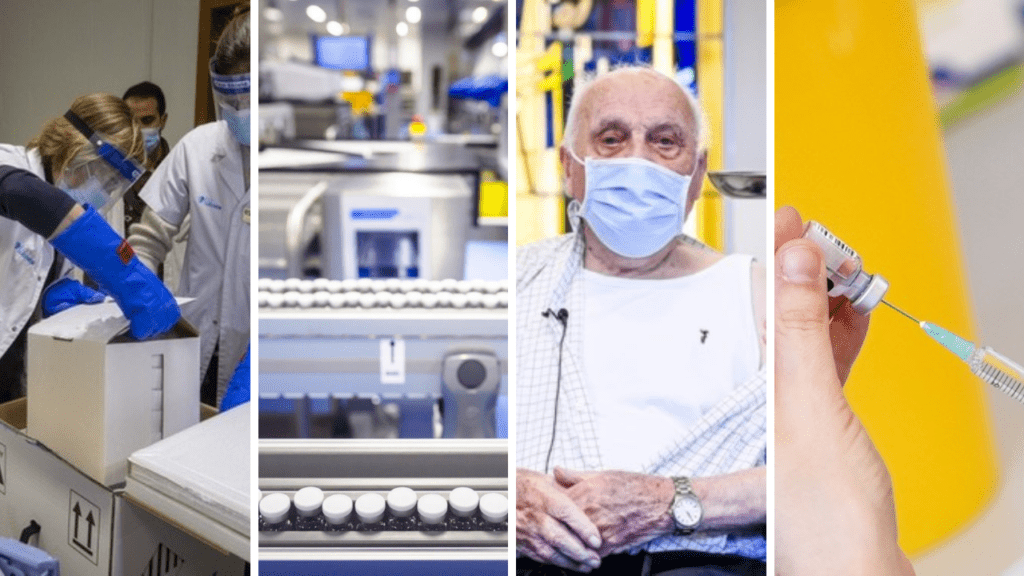Belgium's large-scale vaccination campaign officially started this week and immediately received a lot of criticism for not going fast enough.
As the government is looking for a way to speed up the vaccinations, several questions were left unanswered.
Why is Belgium vaccinating more slowly than other countries?
Belgium's vaccination campaign started cautiously "for good reasons," according to Federal Health Minister Frank Vandenbroucke.
"The first four days, we have given hospitals the time to set up and master the procedure," Joris Moonens of the Flemish Care & Health Agency told VRT. "Above all, we do not want to make any mistakes now and lose valuable vaccines."
However, on Tuesday afternoon, Vandenbroucke announced that he and Prime Minister Alexander De Croo had asked the taskforce for a revised plan to speed up the vaccinations from next week.
No vaccines should be left in a freezer, he said, adding that “they all have to be used as soon as possible.”
How many vaccine doses are available in Belgium right now?
For this week, 87,500 doses of Pfizer's vaccine were available. Of those, 22,700 would be used this week: 6,700 in Flanders, 4,000 in the Brussels-Capital Region and 12,000 in Wallonia), but twice as many were reserved because a second injection is necessary.
These doses were therefore reserved, instead of being used to vaccinate more people.
Flemish Welfare Minister Wouter Beke announced via Twitter that Pfizer also confirmed the deliveries for the coming weeks, meaning that there is no longer a need to hold stocks for the second dose.
Now that there is certainty about deliveries, that blockage is being lifted. "And we can vaccinate residents and staff in residential care centres more quickly," Beke added.
How many doses has Belgium ordered?
Belgium has subscribed to many of the European Union's contracts with different companies, and will receive vaccines from AstraZeneca-Oxford, Johnson&Johnson, Pfizer, CureVac and Moderna.
Currently, Belgium is set te receive over 22 million doses, but most vaccines have to be administered twice to provide the optimum level of protection.
Belgium already decided to purchase more than 7.5 million doses of AstraZeneca’s vaccine, 5 million from Johnson&Johnson, 5 million from Pfizer/BioNTech, 2.9 million from CureVac, and 2 million from Moderna.
The Johnson&Johnson vaccine is the only one that should work with a single injection, meaning that Belgium has enough doses to vaccinate about 14 million people.
Why will Belgium not postpone the second injection of Pfizer's vaccine, as it was considering?
There is no evidence that the Pfizer-BioNTech vaccine developed will continue to provide protection against Covid-19 if the second injection comes later than studied, according to a joint statement by the two companies.
“The protection and efficacy of the vaccine were not evaluated on different dosing regimens, since the majority of test participants received the second dose as specified in the study design,” BioNTech and Pfizer warned.
The vaccine must be given twice for maximum protection, with the second injection taking place three weeks after the first. "There is no data to show that protection after the first dose persists after 21 days."
How do you know it's your turn to get vaccinated?
Everyone will receive a letter informing them it is their turn to get vaccinated, and anyone who wants to can get the vaccine free of charge, according to the authorities.
Belgium decided on the priority groups for vaccination in early December, determining that residents and staff in residential care centres would be the first to be vaccinated, followed by healthcare staff in hospitals.
The third priority group will be other staff members working in hospitals and health services, then people over 65 years old, closely followed by people between 45 and 65 with underlying conditions.
The last priority group will be people working in an essential profession.
After everyone in those groups has been vaccinated, it will be the rest of the adult population's turn.
Do vaccinated people still have to follow the rules?
Yes. Vaccinated people will not be granted special privileges, according to virologist and interfederal Covid-19 spokesperson Steven Van Gucht.
Relaxing the coronavirus measures will be based on the evolution of the figures, according to Van Gucht, who stressed that the more people are vaccinated, the easier it will be to slow down the virus and reduce hospital admissions.
“And, in turn, that will create the prospect of easing the burden on everyone,” he added.
Will people without the Belgian nationality also be vaccinated?
No distinction will be made between people with and without the Belgian nationality when vaccinating the population, as long as they are legal residents.
“Anyone who is a legal resident in Belgium and whose details we therefore have, can be vaccinated,” said the cabinet of Flemish Welfare Minister Wouter Beke.
“In the case of an infectious disease like this, of course, it is not possible to make a distinction on the basis of nationality or status,” they said.
If such a distinction would be made, there is a risk that Belgium would not achieve the vaccination coverage of 70% of the population needed for herd immunity.
Maïthé Chini
The Brussels Times

